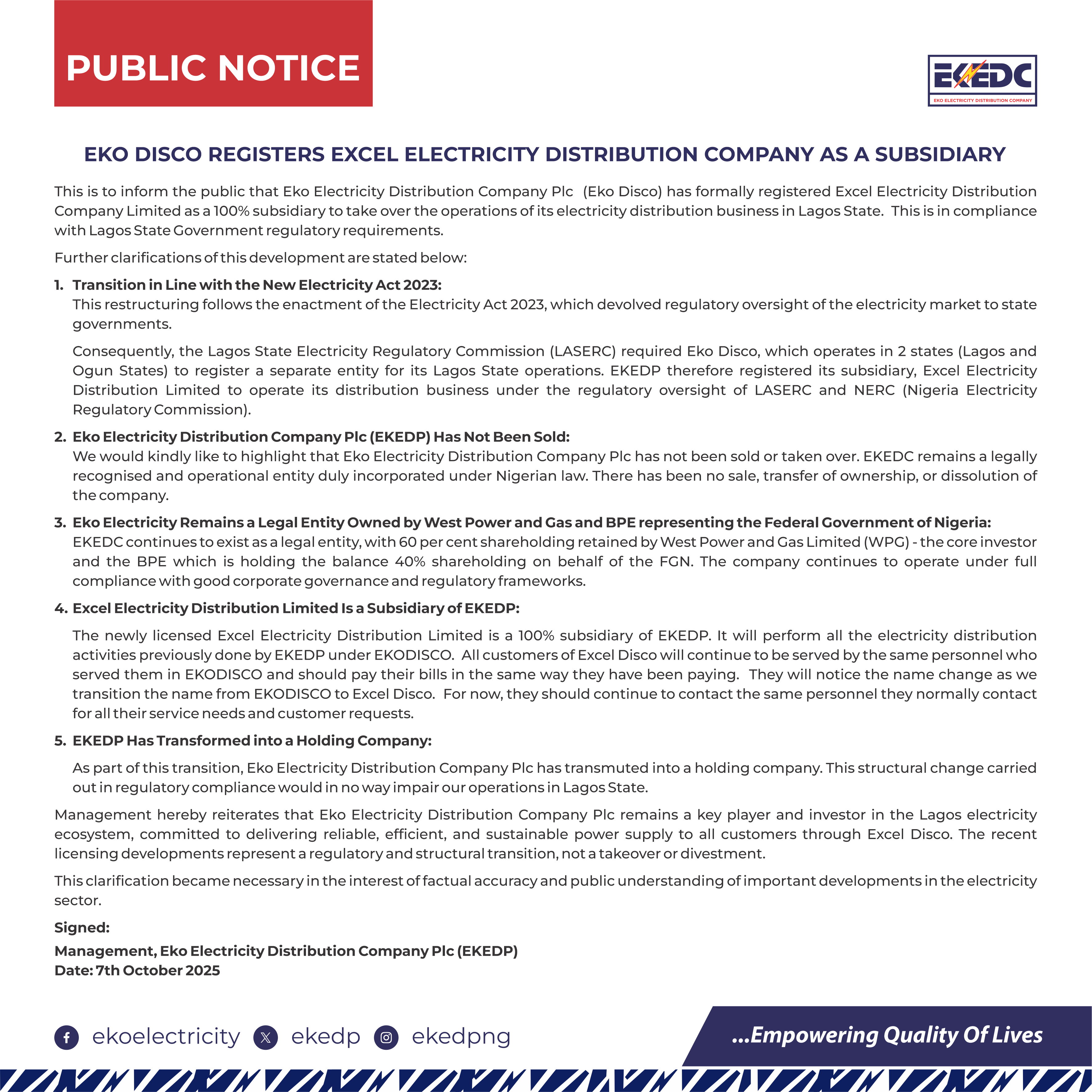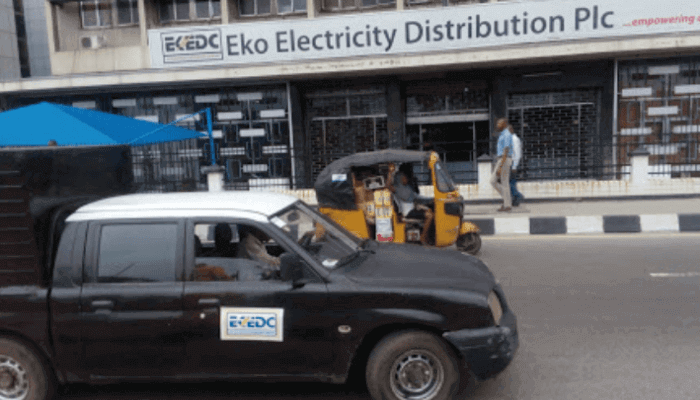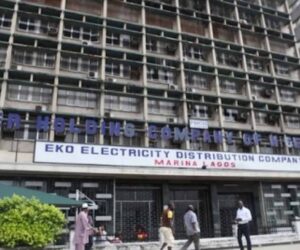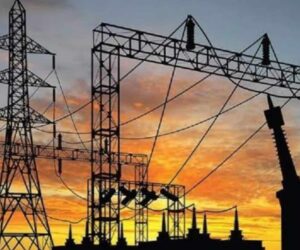Eko Electricity Distribution Company Plc (Eko Disco) announced that it has officially registered Excel Electricity Distribution Limited as a 100% subsidiary to manage its electricity distribution operations within Lagos State.
The announcement, made through a public notice on Tuesday, October 7, 2025, and shared on the company’s verified X handle, marks a significant restructuring under the Electricity Act 2023, a law that devolved electricity regulation to state governments.
For millions of Lagos residents, this change might sound like another corporate shuffle in the power sector, but it actually represents a deeper transformation in how electricity will be managed, regulated, and delivered at the state level.
The restructuring is directly tied to the Electricity Act 2023, which gave Nigerian states the power to regulate their own electricity markets. Previously, all electricity distribution companies (Discos) operated under the national regulator, the Nigerian Electricity Regulatory Commission (NERC).
However, states like Lagos and Ogun, where Eko Disco operates, are now under the oversight of the Lagos State Electricity Regulatory Commission (LASERC). To comply with this new framework, Eko Disco was required to register a separate entity solely for its Lagos operations.

That entity is now Excel Electricity Distribution Limited. According to the announcement, Excel will handle all electricity distribution activities previously managed by EKEDC within Lagos State, under the joint regulatory supervision of LASERC and NERC.
This move essentially localises Eko Disco’s operations in Lagos, aligning it with the state’s new electricity governance model.
Eko Disco is still standing
Amid rumours that the company might have been sold or taken over, Eko Disco made it clear that Eko Electricity Distribution Company Plc (EKEDP) remains intact and operational.
“There has been no sale, transfer of ownership, or dissolution of the company,” the management emphasised.
Eko Disco remains legally recognised under Nigerian law, with ownership split between West Power and Gas Limited (60%) and the Bureau of Public Enterprises (40%) on behalf of the Federal Government of Nigeria.
This clarification was crucial. In an industry often plagued by speculation and misinformation, Eko Disco’s management sought to reassure both investors and customers that the transition was purely structural, not a takeover or sell-off.
A new name, the same service
For the average Lagos resident, especially those already battling unreliable supply, frequent blackouts, and billing concerns, the big question remains: What changes now?
According to Eko Disco, not much, at least on the surface. Customers will continue to interact with the same staff and pay their bills as before. The difference is primarily in the corporate structure, not in service delivery.
“All customers of Excel Disco will continue to be served by the same personnel who served them in EKODISCO and should pay their bills in the same way they have been paying,” the company noted.


This suggests that while Excel Electricity Distribution Limited will now appear on official documents and regulatory filings, the daily realities for customers, meter readings, payments, and maintenance requests will remain largely unchanged.
Still, the creation of Excel marks an opportunity for Lagos to take greater ownership of its power future. With LASERC now overseeing the sector, there is potential for more responsive and localised regulation. In theory, this could translate to improved accountability, faster policy implementation, and, perhaps, better service outcomes over time.
This development is part of a broader effort toward decentralised electricity governance across Nigeria. Since the Electricity Act was signed into law in 2023, several states have begun setting up their own electricity regulatory bodies to take charge of local power generation, transmission, and distribution.
Lagos, as Nigeria’s commercial nerve centre, is naturally at the forefront. The state’s proactive stance through LASERC has positioned it as a model for subnational energy reform.
By establishing Excel Electricity Distribution Limited as a fully owned subsidiary, Eko Disco not only complies with the law but also positions itself strategically for the next wave of competition and innovation in Lagos’ power ecosystem.
What does this mean for the future of power in Lagos?
Eko Disco’s transformation into a holding company, with Excel Disco as its operational arm in Lagos, could pave the way for a more dynamic and responsive power sector.
The holding company structure allows EKEDP to focus on governance, investment, and strategy, while Excel handles day-to-day distribution activities. This separation could enable more targeted management and operational efficiency, as well as make it easier for new investors or technology partners to engage with specific parts of the business.


The move also hints at potential synergies between state-led initiatives and private operators, especially in areas like smart metering, renewable integration, and off-grid electrification, sectors where Lagos is already experimenting with innovation-driven solutions.
If properly managed, this could unlock new opportunities for startups and energy tech companies working to digitise or decentralise Nigeria’s power grid.
For now, Eko Disco’s message to its customers is one of continuity. But the underlying shift is far from trivial. By embracing this state-level regulatory model, Eko Disco, and by extension, Lagos State, has effectively taken a major step toward true energy federalism.
It’s a structural move that, while bureaucratic on paper, could redefine how millions of Lagosians experience power in the coming years.
As Nigeria’s energy market continues to decentralise, all eyes will be on Lagos and Excel Disco to see whether this could be the spark that lights a new chapter in Lagos’ power story. It would also test if local regulation can finally deliver the reliability, accountability, and innovation that customers have long demanded.








